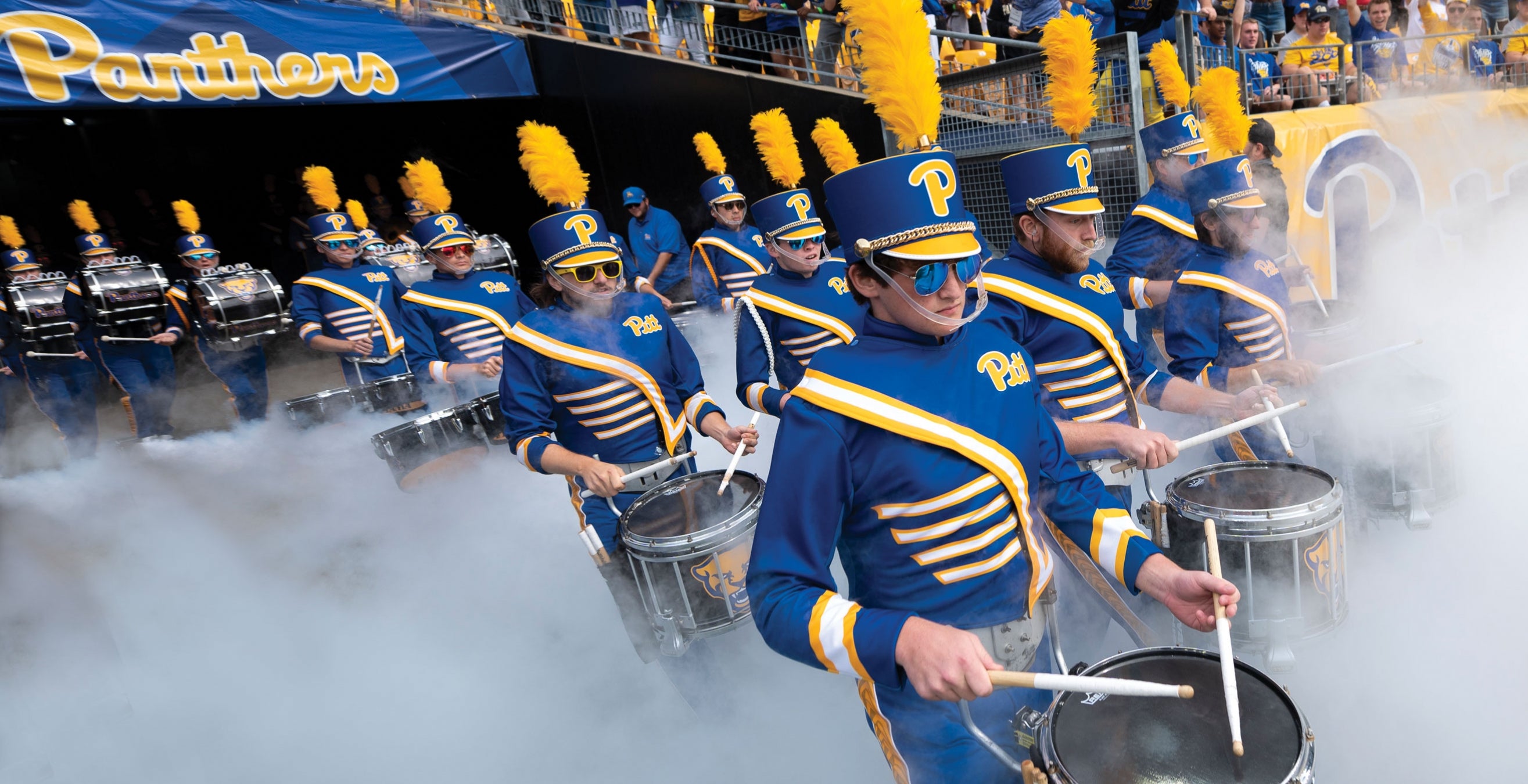On a cloudy September day in 1958, a jam-packed crowd lined the small-town streets of Ligonier, Pennsylvania. About 30,000 people had turned out to watch a parade celebrating the bicentennial of a local fort—and to catch a glimpse of the event’s honored guest, President Dwight D. Eisenhower, who watched the festivities from a central platform.
Leading the parade through the streets was the University of Pittsburgh’s Varsity Marching Band, considered among the nation’s top collegiate bands.
The music, showmanship and precise synchronization of the 120 members of the band seemed to impress President Eisenhower. He even went so far, after returning to Washington, D.C., to forward a letter of appreciation to Pitt, acknowledging that the “famous marching band” had more than lived up to its reputation.
With the band that day, amid a squad of high-stepping, show-stopping herald trumpeters, was J. Roger Glunt. A rising junior at the time, stick-slim and towering, he may have been sweating in his dark navy, wool cross-belt uniform, but his heart was swelling. He was overwhelmed with pride and excitement to perform for the president.
“It was one of the greatest undergraduate experiences I had,” he reflects. “It was an honor I will never forget.”
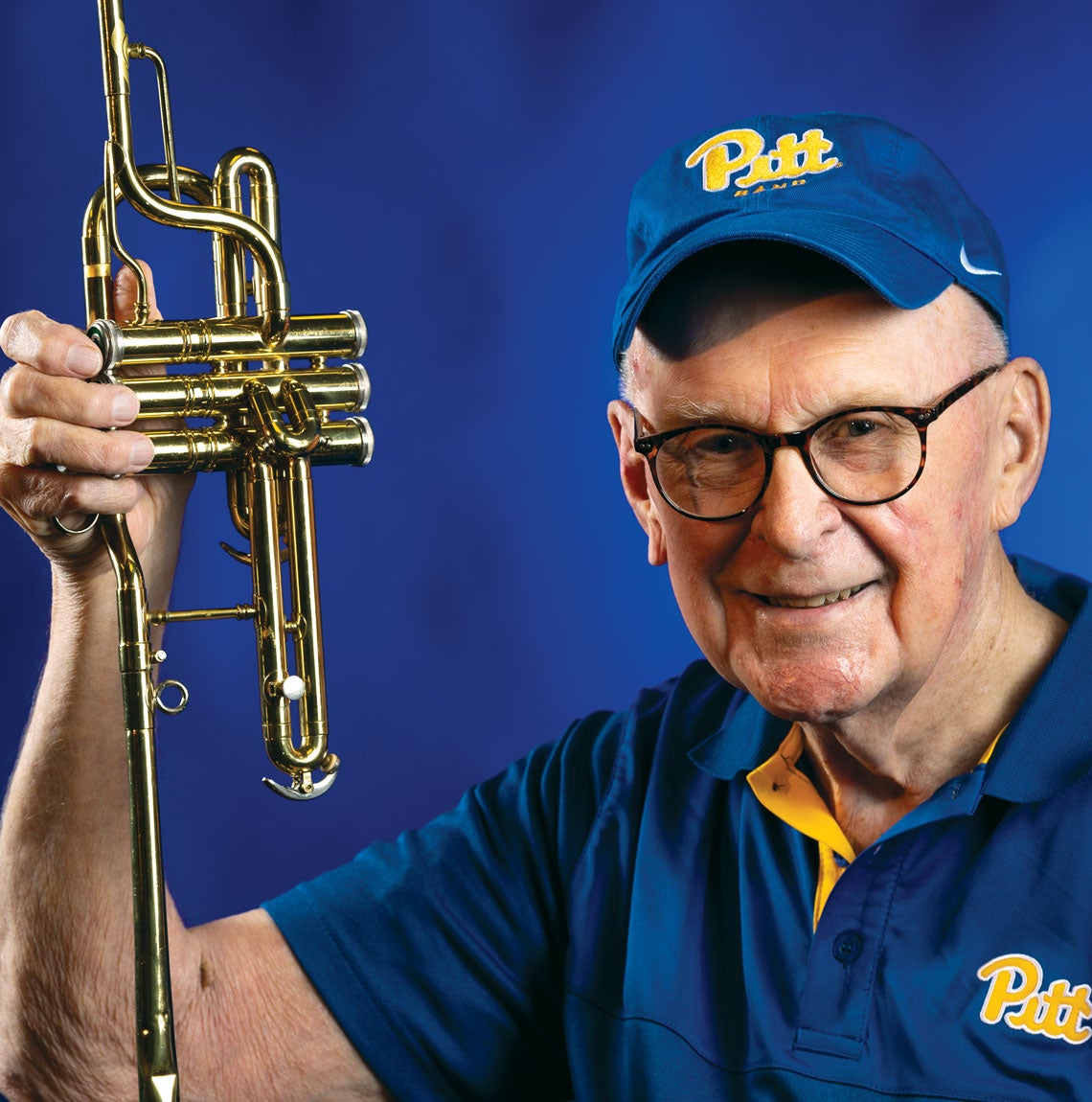 He has plenty of other memories from his days with what is simply and affectionately known by its players and alumni as Pitt Band. So do hundreds of other alumni who credit the Varsity Marching Band—which celebrated its 110th anniversary last year—for shaping their lives in enriching ways.
He has plenty of other memories from his days with what is simply and affectionately known by its players and alumni as Pitt Band. So do hundreds of other alumni who credit the Varsity Marching Band—which celebrated its 110th anniversary last year—for shaping their lives in enriching ways.
“The band was my anchor,” Glunt says, thinking back to his college years. “I got a wonderful education in the classroom, but the band is where I learned so much about spirit, discipline, work ethic, and respect for place and opportunity.”
Every practice, every performance helped shaped his character, he says. The band introduced him to new people and experiences and enveloped him in a family-like community that would follow him throughout his life.
After graduating from Pitt, Glunt (BUS ’60), who hailed from Wilkinsburg, Pennsylvania, served in the military and would launch a successful homebuilding enterprise. With his leadership skills, he would also serve on Pitt’s Board of Trustees and as president of the National Association of Home Builders.
But, he says, he still feels like he’s a part of Pitt Band—and, in a sense, he is. He marches in the alumni band and even established a fund to honor the legacy of his band director.
“Folks like Roger set the example that being part of Pitt Band isn’t just about the four years of your Pitt career, but it’s for a lifetime,” says Brad Townsend, the band’s current director.
So many “Pitt bandies” speak of the meaningful lessons they learned from their band directors. For Glunt, it was Robert L. Arthur, whom he called the “finest instructor” he had at Pitt because of the values and virtues he extolled: “There was always the call for excellence, for service, for pride and representation. It was more than marching and playing instruments, it was about reaching beyond where we were. There was always a higher goal.”
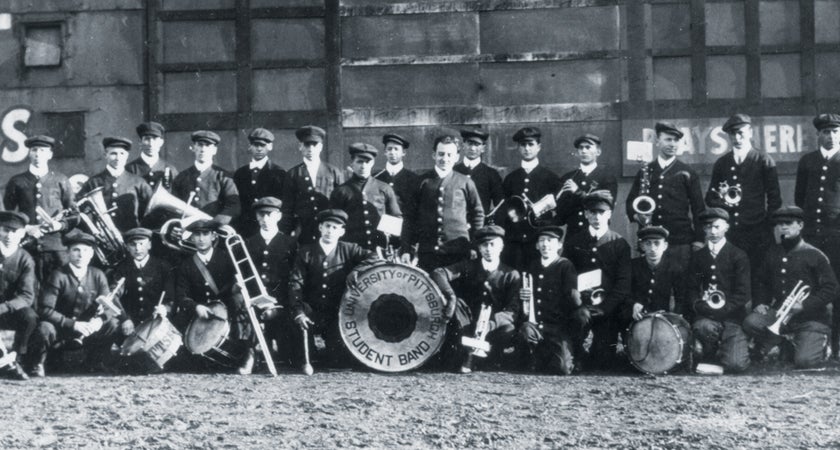 That reach for exceptionalism began in 1911, when eight students borrowed instruments from the local Becker’s Music Store and marched onto Forbes Field in their scarlet felt caps and blue tassels. The band was born that day and has continued to resonate across 11 decades and seven directors.
That reach for exceptionalism began in 1911, when eight students borrowed instruments from the local Becker’s Music Store and marched onto Forbes Field in their scarlet felt caps and blue tassels. The band was born that day and has continued to resonate across 11 decades and seven directors.
Today, Pitt Band has more than 300 tried and tested current members—including musicians playing woodwind and brass, percussionists pounding out beats on the drum line, Golden Girls majorettes twirling batons, and the Color Guard spinning flags. It’s a rigorous gig that comes with a scholarship and a significant time commitment.
Each football season, the band performs to cheering crowds at home games, some away games, and bowl games. To be at their best, they have two-hour practices three times weekly during the fall semester; plus, when there is a home game, the band has an additional rehearsal and a game-day run through. They also play at various University and community functions.
It’s a lot of work and a lot of fun for students. But, Townsend points out, it clearly doesn’t impede their academic standing. One-third of the band is comprised of engineering majors, another third is made up of health care majors, and the remaining third comes from other schools across the University. Band members say there is always someone who can help with homework or give advice on how to balance the workload. In fact, bandies are also involved with honor societies, Greek life and ROTC, among various other campus activities.
Even so, many members and alumni say that their time with Pitt Band is among their top college experiences. All those hours spent practicing, getting to know bandmates, and sharing new expressions and old traditions can cement an emotional and community bond that turns many into one—and one into a stronger and more fulfilled individual.
Jump on the bandwagon:
We asked alumni to share how marching to the beat of Pitt Band’s drum changed their lives. Their stories were music to our ears.
Joseph Brandt, A&S ’82, bass player
 In the summer of 1978, at first-year orientation, I saw a flyer inviting students to join the Pitt marching band. I had enjoyed my time with high school band. But, entering Pitt, I was encouraged to leave all that behind and focus on my studies. Besides, my orientation schedule was full, and I didn’t relish that long, uphill walk to Gate 5 at Pitt Stadium. But something inside of me said “go.” I walked up the hill and the band doors were locked. I knocked. Nobody answered. I walked back down the hill but a voice in my soul said, “Go check again!” I found myself trudging back up Cardiac Hill. This time, the doors at Gate 5 were opened, and I stepped through them and into my destiny.
In the summer of 1978, at first-year orientation, I saw a flyer inviting students to join the Pitt marching band. I had enjoyed my time with high school band. But, entering Pitt, I was encouraged to leave all that behind and focus on my studies. Besides, my orientation schedule was full, and I didn’t relish that long, uphill walk to Gate 5 at Pitt Stadium. But something inside of me said “go.” I walked up the hill and the band doors were locked. I knocked. Nobody answered. I walked back down the hill but a voice in my soul said, “Go check again!” I found myself trudging back up Cardiac Hill. This time, the doors at Gate 5 were opened, and I stepped through them and into my destiny.
I’ve scaled the hill thousands of times now, for practice, football and basketball games and more. My life and soul have become tied to Pitt Band. It’s where I found out who I was and who I wanted to be.
Three years after I graduated, I made a visit to Pitt Band Camp in Johnstown and met Becky Byerly (A&S ’88). She was a sophomore trumpet player who had just joined the band. She would become my wife. Our daughter, Annie (Brandt) McGaughey (A&S ’14), is a Pitt Band alumna, who is married to former drum major Tyler McGaughey (ENGR ’10).
All our lives are tied to that seemingly innocuous moment when I left Fifth Avenue and took my second walk back up the hill.
Ann Persson Bennett, A&S ’01, alto sax squad leader
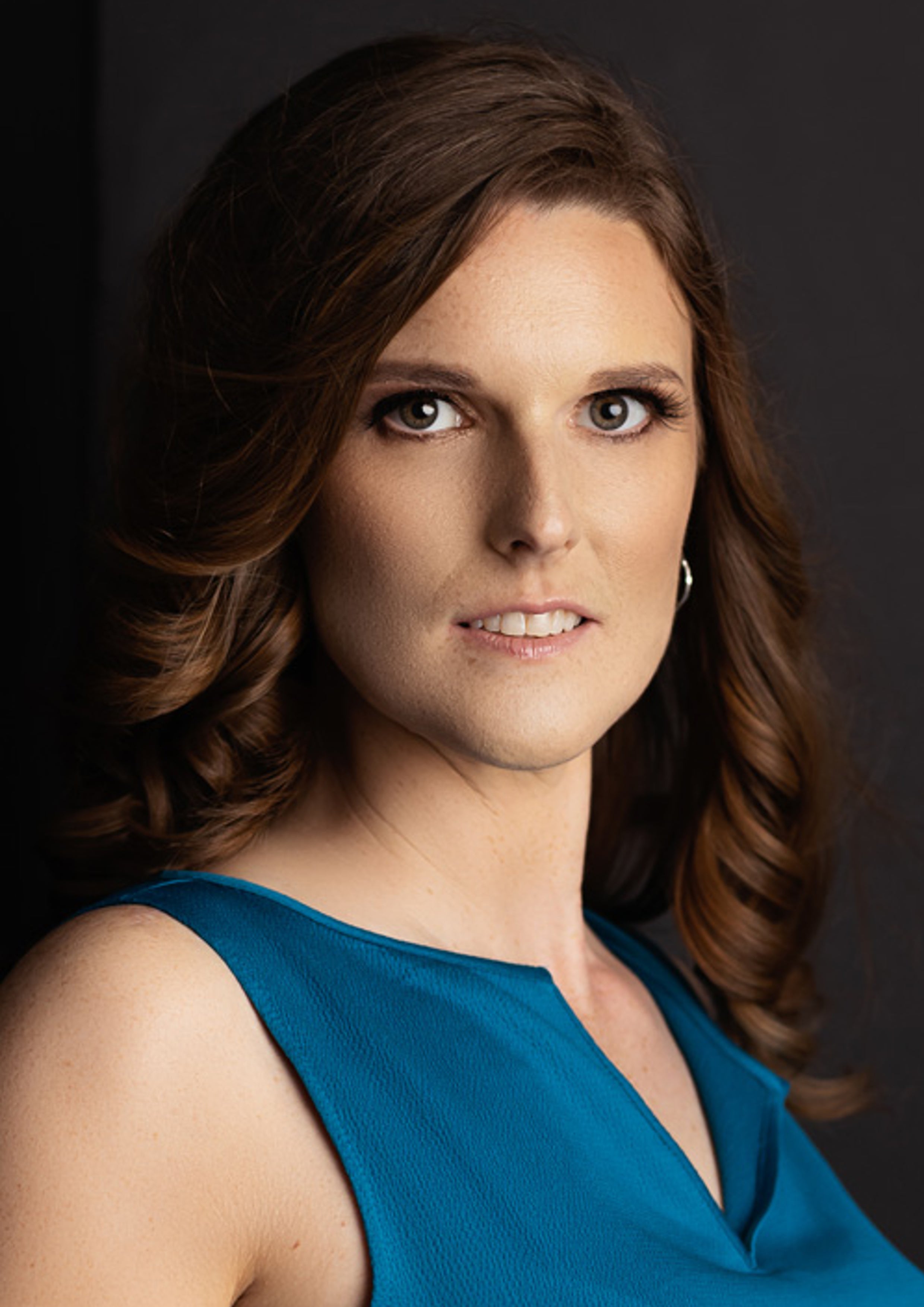 Make no mistake: Being a bandie is being an athlete. You need to have top mental and physical skills to succeed. We practiced at least four nights a week, plus Saturday mornings before home games. And we had to memorize new music and moves for a different show for each home game, plus remember old shows when we went on the road. We had to march from the student union up Cardiac Hill, carrying a heavy instrument in one arm and playing music, too. But that hard work turned a homesick girl into a leader on campus. I was alto sax squad leader for two years, an officer in multiple clubs, started the Anthropology Club, and was inducted into the Omicron Delta Kappa honor society.
Make no mistake: Being a bandie is being an athlete. You need to have top mental and physical skills to succeed. We practiced at least four nights a week, plus Saturday mornings before home games. And we had to memorize new music and moves for a different show for each home game, plus remember old shows when we went on the road. We had to march from the student union up Cardiac Hill, carrying a heavy instrument in one arm and playing music, too. But that hard work turned a homesick girl into a leader on campus. I was alto sax squad leader for two years, an officer in multiple clubs, started the Anthropology Club, and was inducted into the Omicron Delta Kappa honor society.
Schawnne Kilgus, A&S ’08, flute
 It took me two summers into my college career to summon the courage and call Band Director Jack Anderson for an audition. Once I did, I felt like I had found a place in the world. I remember how the Pitt Band helped me to muster the daring to run out of the tunnel onto Heinz Field that first time to the sound of beating drums and a screaming crowd.
It took me two summers into my college career to summon the courage and call Band Director Jack Anderson for an audition. Once I did, I felt like I had found a place in the world. I remember how the Pitt Band helped me to muster the daring to run out of the tunnel onto Heinz Field that first time to the sound of beating drums and a screaming crowd.
The only reason I was able to get to that moment was because of the guidance of Anderson, the hundreds of hours of practice and preparation, and the support from my section leader and my squad. I was terrified and exhilarated—but once I accomplished it, I threw myself headfirst into anything that terrified me: from switching my majors in undergrad in my third year and still graduating on time, to getting a job in the worst economy this country has seen since the Great Depression, to moving across the country to go to law school, to coming back to Pennsylvania and becoming a legal aid attorney who represents victims and survivors of domestic violence and low-income clients.
Pitt Band helped to foster a sense of courage and determination that I didn’t know I had. It gave me a place to be not only a better musician but also a better human.
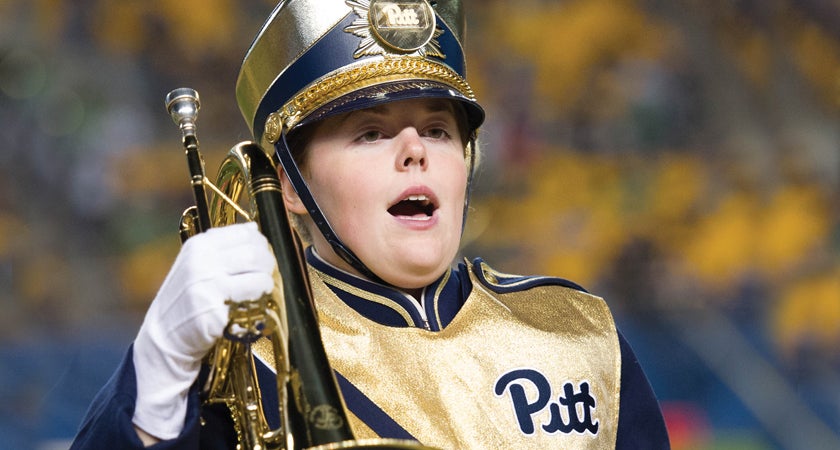
Brian Lincoln, SCI ’89, ’02G, drum major, Color Guard captain, baritone horn
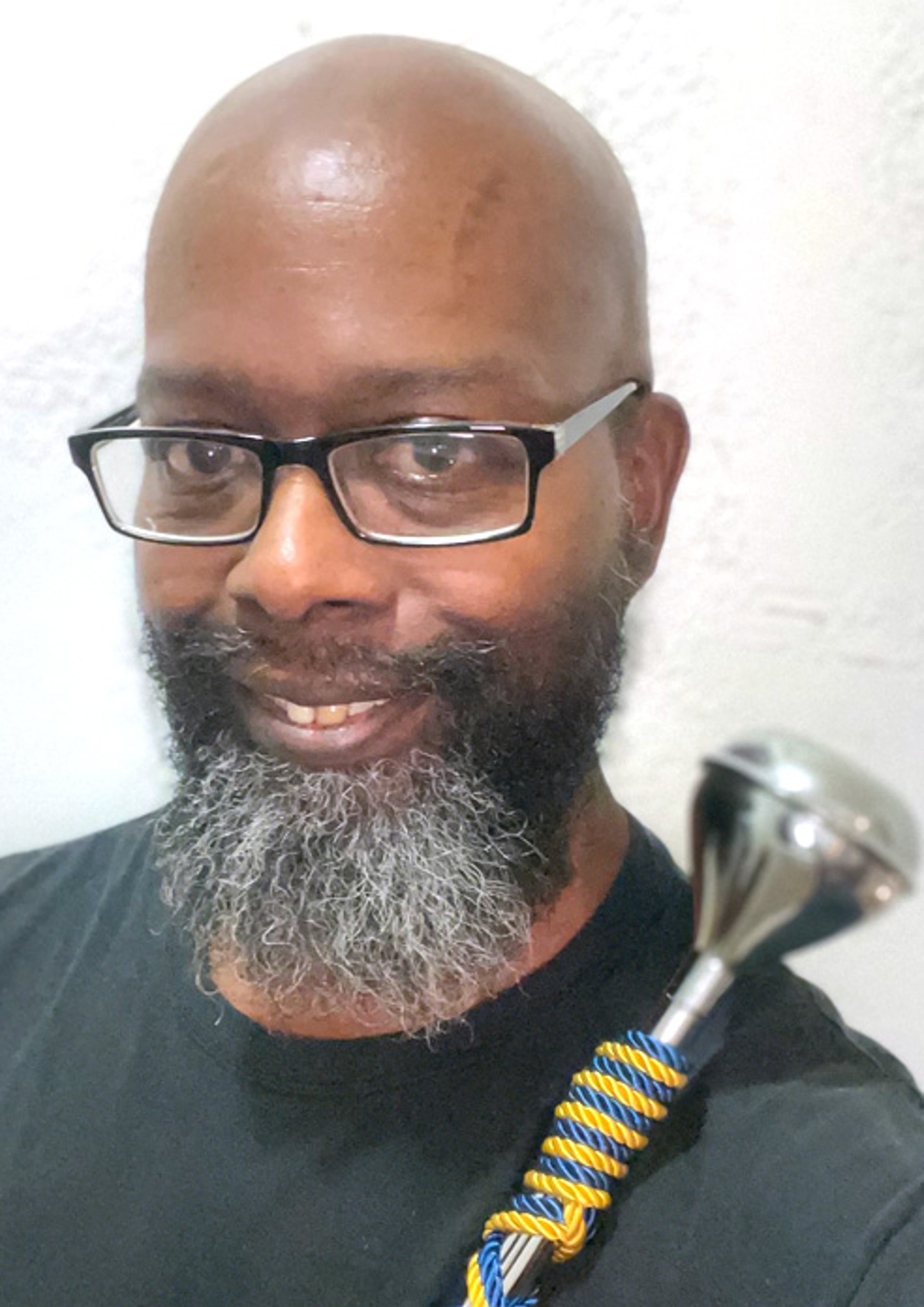 The Pitt Band allowed me to find my niche. After serving on the color guard and as a drum major, I stayed attached to drum corps even after graduation. For many years, while working in computer science, I performed with senior drum corps in Pittsburgh and Harrisburg, and I was on the staff of several excellent high school bands and indoor color guards.
The Pitt Band allowed me to find my niche. After serving on the color guard and as a drum major, I stayed attached to drum corps even after graduation. For many years, while working in computer science, I performed with senior drum corps in Pittsburgh and Harrisburg, and I was on the staff of several excellent high school bands and indoor color guards.
I eventually stopped performing to focus on work and teaching. To remain connected, though, I became an adjudicator. For the past 15 years, I’ve been involved in judging marching band and indoor (color guard/twirling/dance team/percussion) contests locally and along the East Coast. I hope to continue to nurture in others the passion that Pitt Band helped me to find in myself.
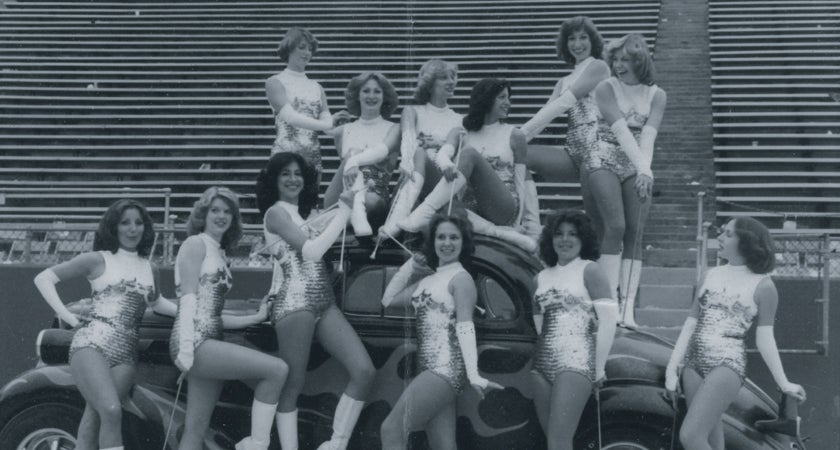
Melanie Peffer, A&S ’09, MED ’14, piccolo
Pitt Band is where I learned leadership, teamwork and conflict management. I learned how to effectively collaborate to get things done and how to collectively reframe negative experiences into positive ones. When we played in the Sun Bowl in 2008, Pitt lost 3-0. It was a long, boring final game of my Pitt Band career. That night, flying back from El Paso, Texas, when we were coming in for landing, everyone started doing the touchdown dance. It was, after all, the only one of the day and a great high note to end the trip on.
Richard Ryba, A&S ’71, alto sax
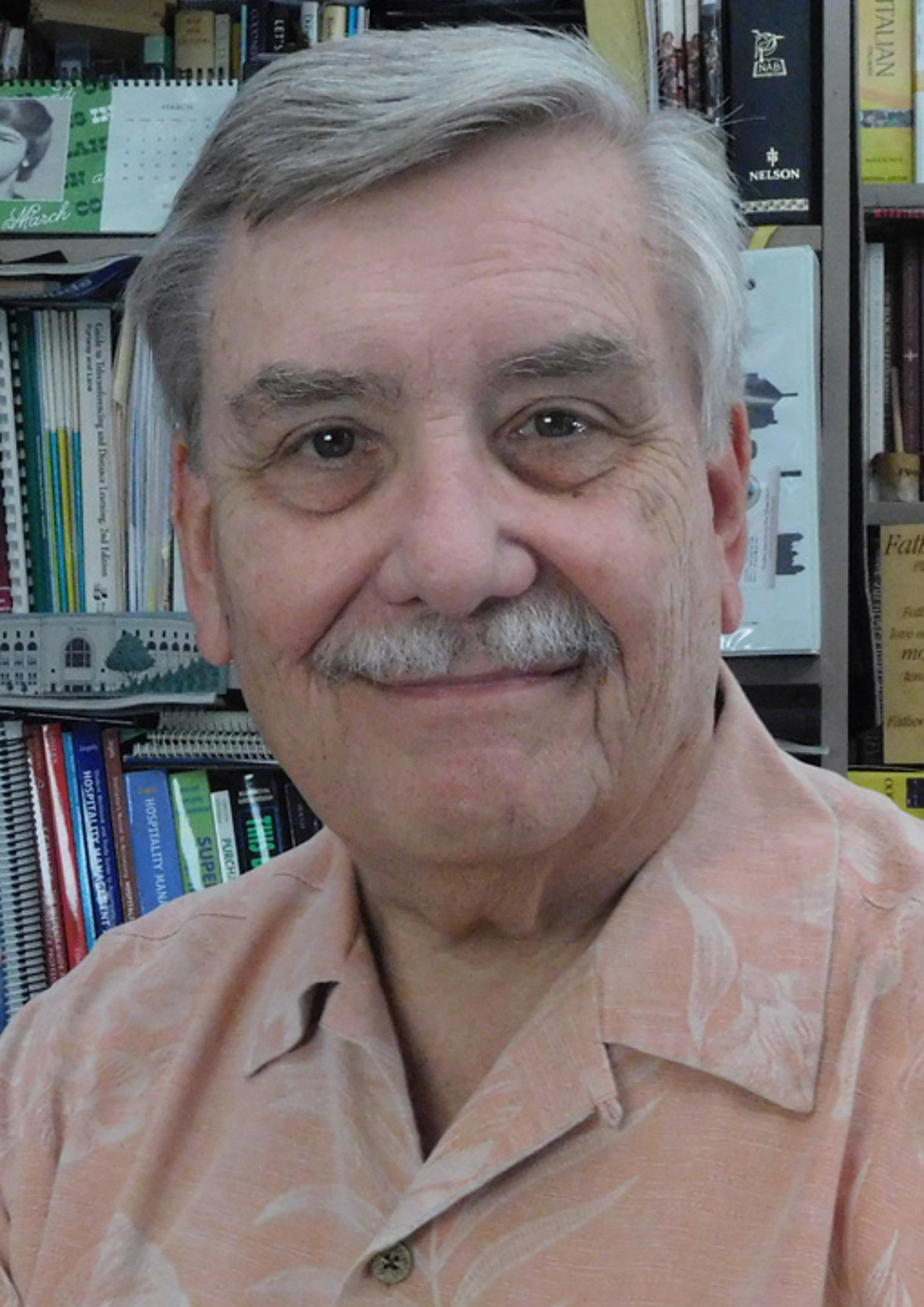 When I joined the Pitt Band in 1967, playing the saxophone, I immediately felt like I was where I should be. Our teams back then weren’t doing well, so at least half-time bolstered the good feelings for the day. We were psyched up for our shows. They brought people to their feet and made me proud to be part of this “high-class organization,” as [Band Director Robert L.] Ace [Arthur] would always remind us it was.
When I joined the Pitt Band in 1967, playing the saxophone, I immediately felt like I was where I should be. Our teams back then weren’t doing well, so at least half-time bolstered the good feelings for the day. We were psyched up for our shows. They brought people to their feet and made me proud to be part of this “high-class organization,” as [Band Director Robert L.] Ace [Arthur] would always remind us it was.
Years later, both of my sons joined Pitt Band. They both played tenor sax. One of my most cherished memories is the three of us marching together at Alumni Band Day.
If I’m out today and wearing any of my old apparel from band, more recent Pitt Band members will stop me and talk like old friends. The band instilled in me the love of being a part of a team. We looked out for each other and created a bond, and it didn’t matter which section you were in—“everyone was your brother. And NOBODY broke through the line!”
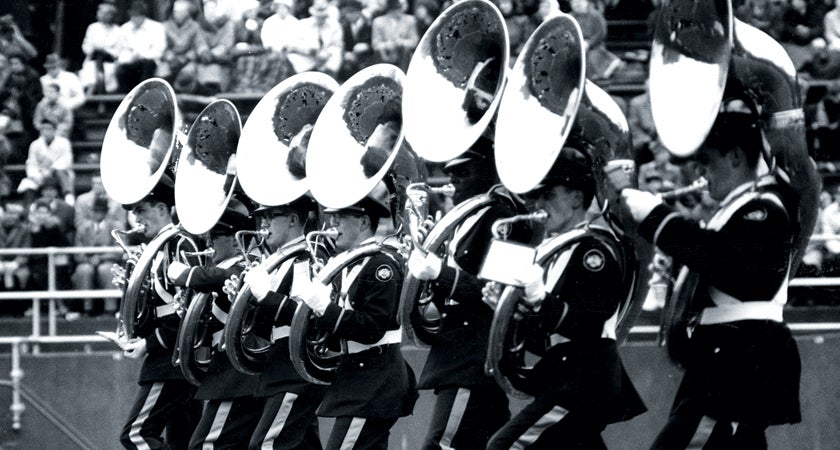
Andrew Marsteller, A&S ’07, ENGR ’22, tenor sax
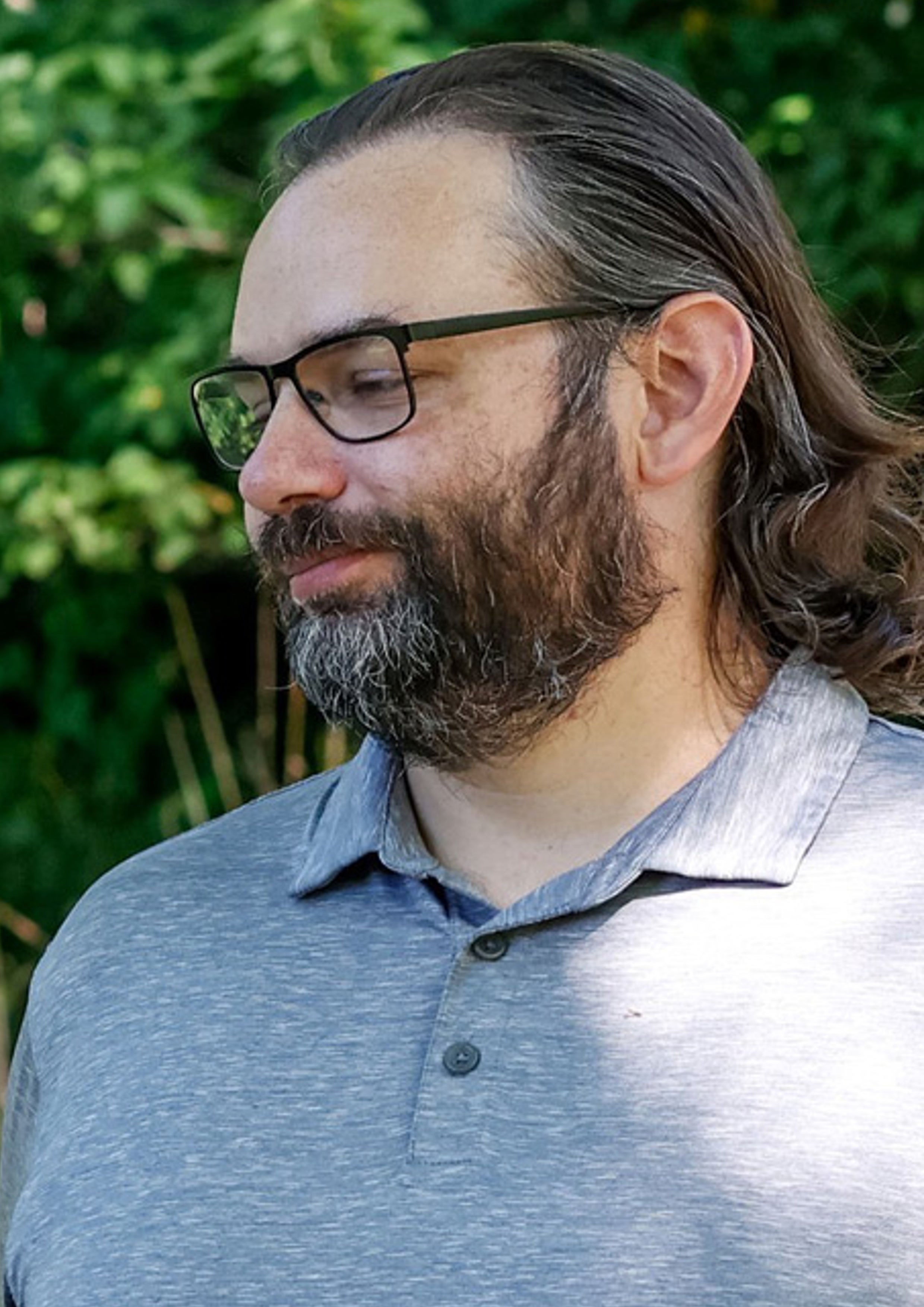 It was the beginning of band camp and, like he had done for years, Band Director Jack Anderson told the first-year students to look around the room because your future spouse might just be nearby.
It was the beginning of band camp and, like he had done for years, Band Director Jack Anderson told the first-year students to look around the room because your future spouse might just be nearby.
That was true for alto sax player Colleen Hale and me. She was beginning at Pitt when she entered Trees Hall to make her way to the band room. I was a junior and goofing around in the hallway, welcoming new band members. That’s how I met Colleen. By 2011, we were married.
Our wedding party evidenced another Anderson prophecy: that Pitt Band was a place to build loyal bonds and kinship like family. My “brothers and sisters” came to our reception and we had enough Pitt bandies that we could have put together a pep band.
Our friendships have continued. After almost a decade in the Coast Guard, I returned to Pittsburgh—and Pitt, where I recently finished another degree. Colleen and I live a five-minute drive from our band friends Dana and Erica (EDUC ’08G) Haakensen’s house. Every morning, I carpool for our daughters, who are in the same kindergarten class. For me, Pitt Band means “family.”
De’Jovia Davis, A&S ’22, drum major and clarinet
 I grew up in Savannah, Georgia, where early on I was immersed in the band culture from nearby historically Black colleges and universities. Coming north to attend Pitt, I crossed cultures. My first instinct was to reach out to what I love: band. I’m so glad I did. Everyone with Pitt Band was welcoming. I came into a group of amazing musicians and people who enjoyed performing, and I could not have realized the impact that joining the band would have.
I grew up in Savannah, Georgia, where early on I was immersed in the band culture from nearby historically Black colleges and universities. Coming north to attend Pitt, I crossed cultures. My first instinct was to reach out to what I love: band. I’m so glad I did. Everyone with Pitt Band was welcoming. I came into a group of amazing musicians and people who enjoyed performing, and I could not have realized the impact that joining the band would have.
In my senior year, I decided to try out for drum major. I knew it was a huge and daunting responsibility. But I was inspired by Crissy Shannon (A&S ’20), Pitt’s first female head drum major for the varsity band. It’s been cool to follow in her footsteps and take that leap of faith to becoming the first African American female drum major with Pitt Band.
In the past few years, the band has survived COVID isolations and participated in the social justice movement, and all of it has allowed me to help open conversations. Band member Melina Hudson helped me found the activism committee, which I think is going to make each of us stronger, not only as bandies but as human beings, as we focus on and talk about issues within our communities. We want to make sure we have great people who are going to go out into the world and do wonderful things, even if it’s not with a band program.
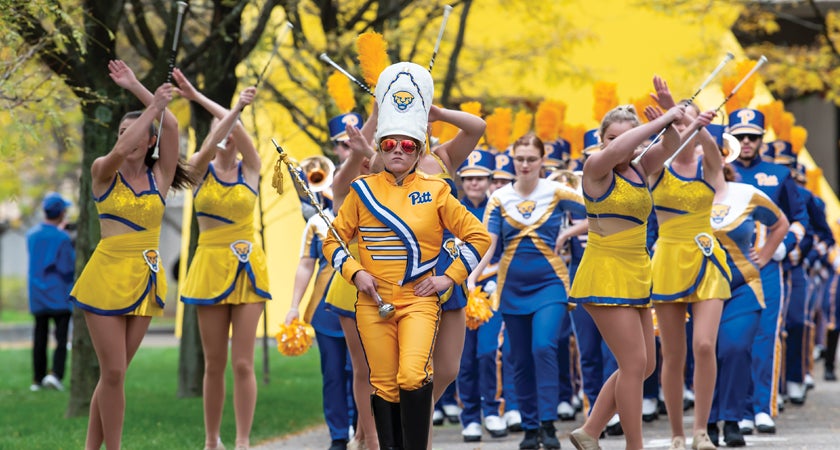
They're With the Band, too: Read more stories from Pitt Bandies here.
This story is from Pitt Magazine's Fall 2022 issue. It was published on October 5, 2022.

